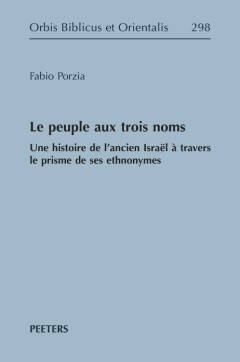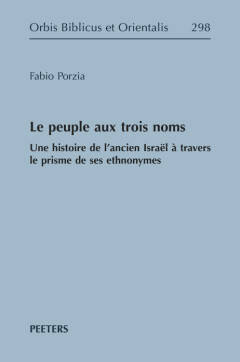
- Afhalen na 1 uur in een winkel met voorraad
- Gratis thuislevering in België vanaf € 30
- Ruim aanbod met 7 miljoen producten
- Afhalen na 1 uur in een winkel met voorraad
- Gratis thuislevering in België vanaf € 30
- Ruim aanbod met 7 miljoen producten
Zoeken
Le peuple aux trois noms
Une histoire de l'ancien Israël à travers le prisme de ses ethnonymes
F. Porzia
€ 84,00
+ 168 punten
Omschrijving
Jewish identity has always been a highly disputed topic. Such a dispute increased with the first archaeological discovery of the so-called Iron Age "proto-Israelites" and the recent debates about the relationship between being a Jew and an Israeli citizen in the modern state of Israel. Notwithstanding a three thousand years old history, the name "Israel" continues to be used. Adopting a diachronic approach to the biblical text, this book retraces the history of the different ethnonyms related to the "chosen people" ("Israel", "Jews/Judeans", and "Hebrews"). Encompassing archaeological, epigraphic and literary evidence, it reassesses the role played by Jewish tradition in the development of concepts such as "peoplehood" and "group identity", which, through the Christian heritage, resulted in the modern concept of Nation-State. The Bible, the Book, is thus not only a source for the orientalist but can also be a useful tradition that may help us to a better understanding of our societies and the relationships they maintain with each other.
Specificaties
Betrokkenen
- Auteur(s):
- Uitgeverij:
Inhoud
- Aantal bladzijden:
- 418
- Taal:
- Frans
- Reeks:
- Reeksnummer:
- nr. 298
Eigenschappen
- Productcode (EAN):
- 9789042950733
- Verschijningsdatum:
- 14/03/2023
- Uitvoering:
- Hardcover
- Formaat:
- Genaaid
- Afmetingen:
- 170 mm x 250 mm
- Gewicht:
- 675 g

Alleen bij Standaard Boekhandel
+ 168 punten op je klantenkaart van Standaard Boekhandel
Beoordelingen
We publiceren alleen reviews die voldoen aan de voorwaarden voor reviews. Bekijk onze voorwaarden voor reviews.











